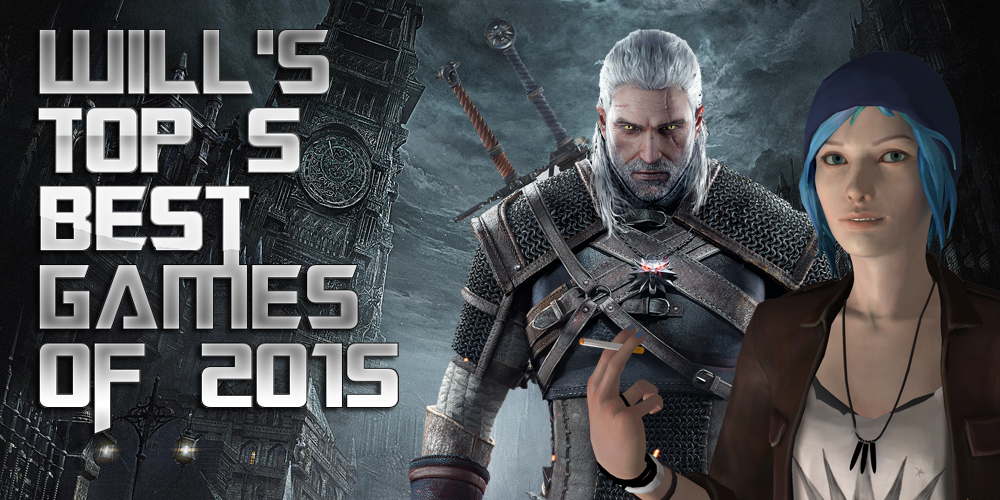
As someone who usually plays the role of the optimist, it was my mission last year to pinpoint what I thought were excellent games in a sea of disappointing and passable releases. Don’t get me wrong, 2014 was a very successful launch year in terms of games available on new consoles, but there weren’t a lot of ideas that pushed the status quo. In fact, the game I highlighted was P.T., and that was merely a teaser for the now cancelled Silent Hills. (#FucKonami)
2015, on the other hand, while still filled with its share of releases that promised revolution and failed, was also host to our first batch of generation-defining games. I didn’t struggle to make a list this year; the opposite, actually, and it hurt every time I had to eliminate one to refine my picks. I don’t think I could ever forget this year as it not only delivered big promises for what’s ahead but genuinely surprised me with some of the most captivating and fascinating games I’ve ever played. I remember the last generation well as the shooter genre dominated supreme, and while I’m glad it had its heyday, I’m so excited where the industry is headed now. Below are the releases that I personally felt defined 2015!
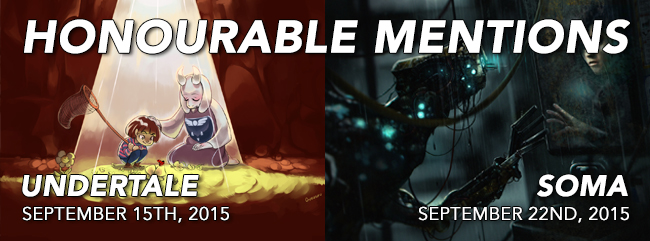
Okay, so I’m going to break my own rules. There were so many games I had to cut, but I couldn’t possibly publish this list without giving at least some credit to the following two games. Undertale is an indie RPG that goes against all the conventional norms of role-playing games. While I personally believe it suffers from pacing issues and a lot of overly obscure tactics in its pacifist route, I simply can’t ignore what this game means for an industry dominated by violence as a convenient mechanic. If you’re a fan of EarthBound or enjoy esoteric humour, do yourself a favour and pick this game up on Steam. Heck, if you’re a fan of RPGs, retro games, indie games or just games in general, go check it out.
Another game I want to talk about is SOMA. It may not have been scary in the conventional sense, but it was one of the most thought provoking games I’ve ever played. I can’t say I liked everything about it because the monsters felt so horribly out of place they would often break my immersion, but, beyond that one major flaw, it’s utterly captivating. The implications of its near-flawless conclusion hit me like a tonne of bricks; so much I can confidently say it has one of the most perfect endings of any game, ever. If you enjoy exploration games, check out SOMA as it boldly showcases the potential of the ‘walking simulator’ genre. It’s also another game where violence wasn’t necessary as a core mechanic.
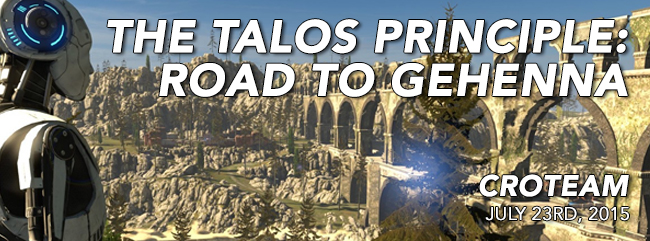
It’s funny to think that The Talos Principle was originally conceived as a new puzzle mechanic for the next Serious Sam game. Although, this isn’t the first time something new has birthed from an existing franchise. Take Devil May Cry, for example; which began life as an iteration of Resident Evil 4. For the longest time, Croteam were typecast as ‘Serious Sam developers,’ so it was a big surprise what an unconventional masterpiece The Talos Principle turned out to be. In fact, I named it one of the best games of 2014 as it delivered such compelling first-person puzzle-solving it easily gives Portal a run for its money while also exploring themes such as history, culture, philosophy, religion and transhumanism.
Road to Gehenna is an expansion that stands squarely upon the shoulders of its predecessor, but, at the same time, surpasses it. On the surface, it’s filled with puzzles that will force you to draw upon everything you’ve learned so far in order to succeed. However, for as captivating as these new challenges are, it stands out again this year because of the concept for ‘Gehenna’ itself; an online society within the game that’s populated by androids trapped in a digital version of purgatory. I was already blown away with Milton and the role it played in the original, but Gehenna takes the narrative experience to new heights. Most importantly, though, it introduces life to an experience that was otherwise devoid of such. There is both conflict and personal motivation in everything you’re doing and this ultimately removes the disconnect between the gameplay, the terminals and your primary objective. If you’re a fan, you need to play this. If you’re new, a deluxe version is now available on PS4 with Road to Gehenna included, so it’s no longer limited to PC!
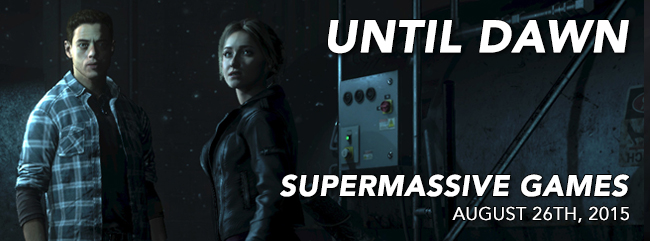
When I first learned about Until Dawn, it was a first-person teen horror being developed exclusively for the PlayStation Move. It sounded terrible, gloriously terrible, and I was ready and waiting; even if it was destined to be slaughtered by critics. I openly admit I have a near-unapologetic love for all horror – it’s the one and only genre I derive entertainment from even if the product is mediocre. Sadly, however, this train wreck wasn’t meant to be. The PS Move idea was binned entirely, and a new third-person horror emerged from its ashes. The new gameplay demo shown reminded me of Heavy Rain with B-horror elements, and this instantly sold me on the game. Going in, I fully expected to be playing a parody akin to Cabin in the Woods. I never anticipated that it would be so innovative and groundbreaking.
I’m going to say it outright: Until Dawn is the best horror adventure since Eternal Darkness: Sanity’s Requiem. For the longest time, developers such as Quantic Dream have tried to make this style of game work only to end up getting stuck halfway between a film and a game. With Until Dawn, Supermassive has laid the foundation for how it can be done while producing an enjoyable and highly polished horror experience. It’s an adventure game brought to life by a compelling cast of characters and a narrative that expertly plays with genre tropes to upturn expectations. It’s certainly not original in all its ideas, but it does deliver one of the most meaningful choice systems to date. What once looked to be a disaster has turned out to be one of this year’s biggest surprises. Expect great scares and to have a tonne of fun!

When you talk about narrative-driven adventure games, it’s very easy to default to Telltale Games who have been dominating that scene ever since The Walking Dead earned critical acclaim back in 2012. Since that time, they’ve seemingly been unstoppable with seven concurrent series now in development. For the most part, I’ve really enjoyed their work, but it’s hard not to grow fatigued with a genre that solely operates on licensed properties and with no creative competition. So, let me tell you how excited I was when I learned that DONTNOD were stepping into the ring. Their previous title, Remember Me was a flawed gem that had an incredible artistic vision but struggled as an action game. It’s clear their creative talents were best suited elsewhere, and I don’t think this genre could’ve been a better fit.
While Life is Strange may have stumbled at the finish line, there is still so much that’s great about this series. Just be aware that if you’ve come looking for the gaming equivalent of Donnie Darko, you’ve come to the wrong place. The science fiction components work to setup scenarios, develop characters and create interesting puzzle solving mechanics, but that’s as far as they go. Don’t expect any definitive answers relating to time travel itself. On the other hand, if you’ve come looking for a story that explores the complexity of human relationships, prepare yourself for one of the greatest emotional rollercoasters in gaming. It’s an experience that truly moved me and more than any other game this year. It’s far from perfect, but there was no other release with more heart, so I can’t recommend it enough.
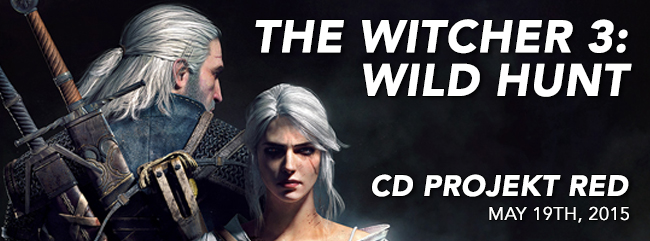
CD Projekt RED are one of the few larger developers that I have the utmost respect for. Naturally, I am a fan of their work, but I also find it so refreshing that despite their continued success, they are still so passionate in everything they do. In every copy of The Witcher 3: Wild Hunt, there is a special thank you note to all the fans; something that feels almost out of place in the AAA gaming world. It’s clear The Witcher 3 was a massive undertaking and that the team at CDPR put their blood, sweat and tears into making it as fully realised as possible. The amount of post-launch support the game received was equally amazing, with frequent patches and some of the most fleshed out DLC of any RPGs.
The Witcher 3: Wild Hunt is arguably the best story-driven open-world game ever created. This is not just because it has one of the most convincing ecosystems of any game, but because of how deeply the narrative is interwoven within all its components. Open-world RPGs have a history of pacing issues when it comes to delivering a main quest line, but as a Witcher, you genuinely feel as if you’re living the life of a Monster Hunter. No matter what you choose to do, it’s always as if you’re exactly where you’re meant to be. For me, that meant countless hours of Gwent, hunting legendary beasts, and getting caught up in political subterfuge as I attempted to track down Ciri and thwart The Wild Hunt. Along the way, I met countless compelling characters, faced the consequences of many difficult decisions, and walked away feeling as if I had left a unique mark on the world. There are a few mild annoyances to contend with, so much that it just falls short as my second pick, but as far as great adventures go, this certainly one of gaming’s finest.
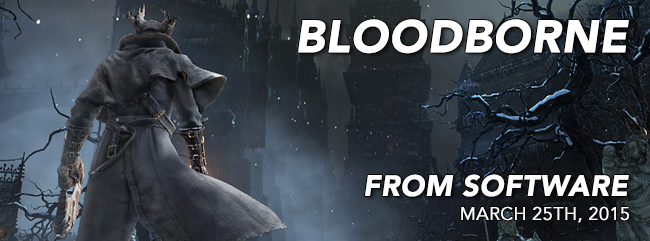
Personally, I look for two qualities in a game of the year: I want to be engaged by great storytelling and I want to have my skills challenged as a player – ideally both. Perhaps, even more important, however, is finding a game that never makes me feel like I’m wasting time. Too many games today make me feel like I’m simply going through the motions, and that leaves me feeling frustrated and hollow. Arkham Knight, Mad Max, Battlefront, AC Syndicate, Black Ops III, and even Fallout 4; all decent enough AAA games, but I struggled to derive anything deep or meaningful from them.
If you’re a fan of the Souls’ series, you’ll already understand why I’ve chosen Bloodborne. If you’re not, however, let me take a moment to explain why. For me, there were only two GOTY contenders in 2015: The Witcher III: Wild Hunt and Bloodborne. It was a hard choice too because I thoroughly believe The Witcher III is a revolution for both writing in RPGs and open-world game design. However, not all of its components are equal, and this is why I can’t overlook Bloodborne as it is without a doubt the most harmonious game to be released this year. What exactly do I mean by ‘harmonious’? Basically, it’s that every component of the game comes together holistically to create an experience that’s perfectly balanced. While Dark Souls was once a revolution, Bloodborne is the game to truly refine the concept.
With a deep Lovecraftian-inspired universe that’s expertly crafted down to the last cobblestone, Bloodborne is not only the most elegant Souls experience to date, it’s the most definitive game of 2015. It’s an experience that is arduous but rewarding, challenging but fair, and even better when experienced with other people. By cutting away the fat which slowed down its predecessors, it’s much more accessible to newcomers but still pushes veterans to their limits and encourages all to master its mechanics. Most importantly, though, it’s a game that respects you enough to give you the tools you need and allows you to discover its nuances on your own. Like a controversial piece of art, I totally understand why some might not enjoy it, but I do think the industry as a whole should be able to appreciate it. If you own a PS4 and have not tried it, however, give it a shot as that’s the only way to know if it’s for you. GOTY 2015!











